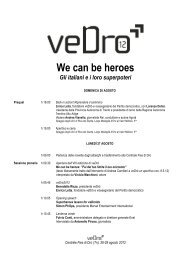democracy - Vision the Italian Think Tank
democracy - Vision the Italian Think Tank
democracy - Vision the Italian Think Tank
You also want an ePaper? Increase the reach of your titles
YUMPU automatically turns print PDFs into web optimized ePapers that Google loves.
decide to divide her/ his own vote and decide to use to express a preference within<strong>the</strong> constituency to which he/she feels to belongs.Such citizenships can be different because <strong>the</strong>y can correspond to different cities, ornations. But we should also be able to demonstrate that we are instead “Europeans”or decide that we belong to communities that are not defined by any geographicalterm, but are instead referred to cultural, professional, or even single political issues.In any case constituency will have to be something different from an “interest group”and will need to correspond to a political arena divided internally in more than onepolitical position.There are obviously a number of problems to be solved: regulations will provide for<strong>the</strong> possible constituencies to be limited to a list of significantly enough group ofcitizens (and thus electors will have to choose among such a menu of possibilities)and to avoid fragmentation of <strong>the</strong> system into “corporations”; <strong>the</strong> choice of <strong>the</strong>constituency will stay <strong>the</strong> same for a number of years and rules will avoid abuses of<strong>the</strong> system such as changing electoral body just for <strong>the</strong> purpose of giving <strong>the</strong> vote tosomebody who is candidate in that body.These are, in fact, long term possibilities because such radical revisions of <strong>the</strong>representation mechanisms are, evidently, correlated to more complex changes in <strong>the</strong>fiscal system and into <strong>the</strong> distribution of competencies between distinct institutionallevels.In <strong>the</strong> short term however, we need to do something and to experiment some form ofdeviation from <strong>the</strong> geographically based constituencies.Voters have to be able to, and even more to those of <strong>the</strong> European elections, choosebetween regional and European or national based constituencies. And more rapid,flexible and concrete has to be <strong>the</strong> chance for any European citizen (or foreignworker) to participate in <strong>the</strong> elections in <strong>the</strong> country he/she works. We also need tofind <strong>the</strong> mechanism that makes possible to distribute one’s vote among more localelections if one commutes between different places and pays taxes to more than onecity council.These operations are all possible even if <strong>the</strong>se institutional changes require a strongwill to bring innovation in mechanisms that many think unchangeable. And even if<strong>the</strong> electronic vote, and more precisely, <strong>the</strong> electronic choice of <strong>the</strong> constituency tobelong to that would be necessary for <strong>the</strong> reforms we are envisaging, still presents anumber of technical difficulties.The technology that would replace <strong>the</strong> electoral list as a physical archive (and <strong>the</strong>voting station as a physical place for expressing <strong>the</strong>ir preference), makes it possibleto realize what previously was extremely expensive and complex.Certain costs have become a fraction of what <strong>the</strong>y used to be and it is certainlytechnologically possible to imagine electoral boards that in a more flexible wayreproduce <strong>the</strong> articulation of a Society that in <strong>the</strong> mean time has greatly evolved.28





